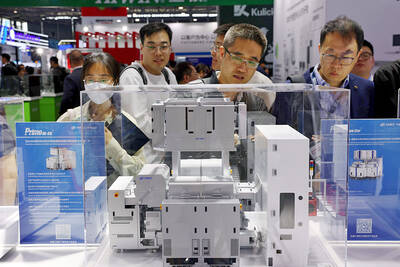Television and online retailer Momo.com Inc (富邦媒體) has turned conservative over the outlook of its investment in Malaysia, after the scheduled launch of its joint venture in the Southeast Asian nation next quarter was postponed.
“We are not certain if the joint venture can start operating before the end of this year... There are some details and uncertainties that we are still negotiating with our local partner,” Momo.com president Lin Chi-feng (林啟峰) told a media gathering in Taipei on Wednesday.
Momo.com, a subsidiary of the nation’s second-largest telecom operator, Taiwan Mobile Co (台灣大哥大), in February announced plans to set up a joint venture with Malaysian shopping mall operator Pavilion Trading Enterprise Sdn Bhd.
The proposed joint venture is to have paid-in capital of NT$400 million (US$13.23 million), with Momo.com investing NT$180 million for a 45 percent stake.
As Momo.com’s third overseas joint venture, the Malaysian investment is part of the retailer’s strategy to grow its presence in Southeast Asia.
The company formed its first overseas joint venture in Thailand in 2014 and the second one in Beijing in 2015.
Earnings from its two overseas ventures contributed about 10 percent to Momo.com’s net profit of NT$309.92 million last quarter, Lin said.
Momo.com had high hopes that it could start running a 24-hour TV shopping program, online sales and catalog shopping operations in Malaysia next quarter at the earliest so they could contribute to revenue this year.
Lin said the details of opening a TV channel have been settled, but other issues relating to operating a retail firm in a foreign nation still need to be sorted out.
He declined to elaborate.
Although the Malaysian venture has been stalled, the company will continue to seek cooperation opportunities in other Southeast Asian markets, such as Vietnam or the Philippines, Lin said, adding that he plans to go to Vietnam next week to visit local retailers.
Lin said the company expects domestic sales this year to outpace last year’s, supported by a recovering local economy and increasing cooperation with brand vendors, such as Microsoft Corp and South Korea’s Korean Ginseng Corp.
“Domestic demand in the first five months of this year strongly exceeded the company’s expectations,” Lin said.
He declined to offer an annual revenue target.
Momo.com’s sales grew 9.64 percent annually to NT$10.04 billion in the first four months of this year, its filing with the Taiwan Stock Exchange showed.
Shareholders of Momo.com on Wednesday approved the company’s plan to distribute cash dividends of NT$8 per common share.
That translates into a payout ratio of 94.67 percent based on its earnings per share of NT$8.45 for last year, and a yield of 3.64 percent based on yesterday’s closing price of NT$219.50 in Taipei trading.

With this year’s Semicon Taiwan trade show set to kick off on Wednesday, market attention has turned to the mass production of advanced packaging technologies and capacity expansion in Taiwan and the US. With traditional scaling reaching physical limits, heterogeneous integration and packaging technologies have emerged as key solutions. Surging demand for artificial intelligence (AI), high-performance computing (HPC) and high-bandwidth memory (HBM) chips has put technologies such as chip-on-wafer-on-substrate (CoWoS), integrated fan-out (InFO), system on integrated chips (SoIC), 3D IC and fan-out panel-level packaging (FOPLP) at the center of semiconductor innovation, making them a major focus at this year’s trade show, according

DEBUT: The trade show is to feature 17 national pavilions, a new high for the event, including from Canada, Costa Rica, Lithuania, Sweden and Vietnam for the first time The Semicon Taiwan trade show, which opens on Wednesday, is expected to see a new high in the number of exhibitors and visitors from around the world, said its organizer, SEMI, which has described the annual event as the “Olympics of the semiconductor industry.” SEMI, which represents companies in the electronics manufacturing and design supply chain, and touts the annual exhibition as the most influential semiconductor trade show in the world, said more than 1,200 enterprises from 56 countries are to showcase their innovations across more than 4,100 booths, and that the event could attract 100,000 visitors. This year’s event features 17

Germany is to establish its first-ever national pavilion at Semicon Taiwan, which starts tomorrow in Taipei, as the country looks to raise its profile and deepen semiconductor ties with Taiwan as global chip demand accelerates. Martin Mayer, a semiconductor investment expert at Germany Trade & Invest (GTAI), Germany’s international economic promotion agency, said before leaving for Taiwan that the nation is a crucial partner in developing Germany’s semiconductor ecosystem. Germany’s debut at the international semiconductor exhibition in Taipei aims to “show presence” and signal its commitment to semiconductors, while building trust with Taiwanese companies, government and industry associations, he said. “The best outcome

Semiconductor equipment billings in Taiwan are expected to double this year, as manufacturers in the industry are keen to expand production to meet strong global demand for artificial intelligence applications, according to SEMI, which represents companies in the electronics manufacturing and design supply chain. Speaking at a news conference before the opening of Semicon Taiwan trade show tomorrow, SEMI director of industry research and statistics Clark Tseng (曾瑞榆) said semiconductor equipment billings in Taiwan are expected to grow by an annual 100 percent this year, beating an earlier estimate of 70 percent growth. He said that Taiwan received a boost from a